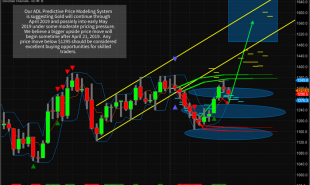
Source: Streetwise Reports 08/23/2018
Rob McEwen, chairman and chief owner of McEwen Mining and former CEO of Goldcorp, speaks to Streetwise Reports about the impact of trade wars on the dollar and precious metals, where he sees the growth in precious metals equities, and how he plans to qualify McEwen Mining for the S&P 500.

The Gold Report: Prices of some commodities have been falling. What are your thoughts on the current commodities market?
Rob McEwen: The commodities market has been adversely impacted by the strong dollar and the discussion of a trade war possibility, which may already be happening. With the economies of America, Europe and Asia picking up, most investors are asking, why buy gold or silver? The dollar is the key. When it starts dropping, we will see the price of gold, silver and all commodities improve.
TGR: What is your sense of that? Do you think that we might be in for a longer period with a stronger dollar?
RM: Many foreign governments and companies borrowed in dollars, thinking the dollar was going lower relative to their own currencies. But the dollar has done the complete opposite. So now, these borrowers of $US are being squeezed as their borrowing costs have risen dramatically. This is creating financial distress in certain corners of the world. At these locations the price of gold has been climbing quickly.
When will we see the gold price going up in America? Look to the fall; that is when investors will turn their attention to some of these developing problems that exist outside of America and consider how it will impact America.
TGR: What about gold equities? Do you see their prices recovering irrespective of the price of gold or are the two looped together?
RM: During the past two months, gold equities have been performing better than bullion. In the past, rallies in the gold equities have been an early signal of an improving gold market. When I look at how well the gold equities have held up relative to the drop in the gold price, I'd say that's a very positive sign. Also, there's a seasonality factor to consider. We are entering the fall, which often has been good period for gold and silver.
I'm optimistic about the price right now. It is a good time to be buying. Investors' sentiment is extremely bearish for gold. So, if you are brave enough to act as a contrarian, it's time to buy this sector!
TGR: What mining companies are you paying close attention to?
RM: I believe the junior and midtier explorers and developers are going to be the focus of the market. This is where investors will make the largest percentage gains. They have growth in production and resources, whereas, most of the seniors have sold current and future production to pay down their heavy debt loads. So, they have a negative slope on their production profiles where the juniors and the midtiers will have positive growth.
There are a couple of juniors I watch closely. I'm talking my own book though, so I want to caveat emptor:
One, Mawson Resources Ltd. (MAW:TSX; MWSNF:OTCPK; MRY:FSE) is an junior exploration company actively exploring in Finland. It has some very interesting, high-grade gold drill results. Earlier this year, Goldcorp Inc. (G:TSX; GG:NYSE) purchased 12.7% of the company.
Two, Pure Gold Mining Inc. (PGM:TSX.V) is an exploration and development story operating in the prolific the Red Lake district in Ontario, Canada, which is around my old stomping ground with Goldcorp.
Three, Monarques Gold Corp. (TSX-V:MQR) is a small, growing gold producer that has been steadily building its resource and production base in Quebec, Canada. It has been buying growth at attractive prices when few are buying.
Four, B2Gold Corp. (BTG:NYSE; BTO:TSX; B2G:NSX) is a midtier producer with a diversified production base. Its management team has been executing well on its growth strategy and its shares have been performing better than the industry.
Beyond these four companies there are numerous juniors and midtiers with good exploration results and positive low capex development stories that the market is just not paying any attention to. I believe now is the time to be building positions in these companies.
Senior producers such as Goldcorp and Agnico Eagle Mines Ltd. (AEM:TSX; AEM:NYSE) are in the market buying. They are stepping over the intermediate-sized companies and going after the development or late-stage exploration companies. Compounding this demand are the intermediate producers that are also looking to buy the same type of companies. For these reasons, I favor the juniors that have interesting exploration stories. I believe this is where your readers have the opportunity to make their biggest gains in the sector, make the biggest returns.
TGR: What do you see happening in mergers and acquisitions (M&A)?
RM: The majority of the senior producers need new resources, need new projects for their production growth pipeline to prop up their share prices. In the past four years they have gutted their exploration departments and budgets as well as selling off mines to reduce their debt and rid themselves of high cost mines. To address these needs the seniors have been buying future production. This trend feels like it is going to accelerate. M&A activity should pick up in the fall.
TGR: Let's turn to McEwen Mining Inc. (MUX:TSX; MUX:NYSE). Can you bring us up to date on what's been happening with the company?
RM: There's been a lot happening. We have three active mines producing gold and silver, we are constructing our fourth and we are finalizing plans for a fifth mine. Our mines are located in the Americas: in Canada, Mexico, Argentina, and our fourth mine is scheduled to begin operations in Nevada in Q1/19.
Here is a quick overview of our operations. In Argentina, we have a 49% interest in the San José mine, an underground gold-silver mine that began production in 2007. It is one of the highest grade gold-silver mines in the Americas with a resource grade of 457 grams per tonne (g/t) silver and 6.7 g/t gold. It is located on a large property package that surrounds one of Goldcorp's largest mines, its Cerro Negro mine.
Also in Argentina, we have 100% of a very large copper deposit, Los Azules, with about 30 billion pounds of copper. We are working on an access route that would dramatically change the value of this project. Currently, we're only able to get in and explore this property about four and a half months of the year because we have to go over two high mountain passes that get blocked by winter snow. We believe we've found a route from the north that would allow us 12-month access below the snow line, which would dramatically improve the value by giving us year-round access and low altitude power, and it would make our drilling and exploration and development costs a lot cheaper if that works.
In Mexico, our 100%-owned El Gallo gold mine is an open-pit mine, heap leach operation. We stopped mining in May of this year but will continue producing ore into 2020. Recently we released a preliminary economic assessment (PEA) on a project that would utilize the existing facilities to process gold and silver ores from nearby satellite deposits. The PEA shows a low capex, long life project (10-12 years) with a 20% internal rate of return (IRR) at current prices. We will have a feasibility study on Project Fenix out early next year.
In Nevada, we're building a mine called Gold Bar. I was just down there. It's about half built. We expect it to be completed before year-end and in production in Q1/19. It will be an open-pit, heap-leach gold mine that we own 100%. It is located in a world-class district for gold discoveries and mines. It is 25 miles south of Barrick Gold Corp.'s (ABX:TSX; ABX:NYSE) Cortez Hills property, Goldrush zone and its very recently announced Fourmile discovery, where ABX pulled some spectacular drill assay results; 70+ grams over 16 meters was one of the holes.
This discovery is very encouraging for us because it opens up new possibilities for a bigger, longer life mine at Gold Bar. Up until very recently our geologists had concentrated solely on exploring for shallow oxide gold ores that could be recovered by heap leaching. We did have a few sulphide hits that were higher grade and longer intercepts, but there was never any further follow-up. That has now changed and drilling on deeper targets has just commenced.
In Timmins, Canada, we bought two packages of properties last year. In April, we bought a company called Lexam VG Gold Inc. and in October we bought the Black Fox Complex from Primero Mining Corp. These purchases gave us three large land packages along a geological structure that has yielded over 200 million ounces of gold over the past 100 years. This structure is locally referred to as the Golden Highway.
The Black Fox Complex included an underground mine producing approximately 50,000 ounces of gold per year, an operating mill with excess processing capacity and great exploration potential. The previous owner purchased the complex in 2014. They paid and subsequently invested a total of $560 million. We were able to buy it for a very attractive price of $35 million. And for that, we got production, albeit a short-life mine at the moment, of 50,000 ounces (50 Koz) per year, a very large land package in a prolific gold district, $180 million of tax loss carry forwards that we could apply against future profits, along with an operating process plant (mill) that had excess capacity. Not only was it an inexpensive purchase, it was also very strategic because we could take the assets that we purchased earlier in the year and process those resources at the mill. For 2018, we have a $15 million exploration program underway at the Black Fox complex, and it's delivering good exploration results to date.
So all in all, there's a package of three sources of production with a fourth coming onstream and good exploration in two world-class areas, Nevada and Timmins, Ontario. And then if your readers like copper, we have a very large copper deposit that has robust economics at $3 copper. So I'd say we're in good shape right now. We have a small level of debt. I own 24% of the company. I have better than $130 million invested personally, and that's my cost base in the company. I take a dollar a year as salary and have chosen to not take any options or bonuses while I'm running this company. I want to be very close to my shareholders and make money the same way as my shareholders do, and that's through a higher share price.
TGR: You have said that one goal is to have McEwen Mining qualify for the S&P 500. How do you see that happening?
RM: We're moving purposely toward our goal. In order to qualify, I believe we have to build our annual gold production to 600,000 ounces and have a pipeline of future production that would lift our annual production up to over 1,000,000 ounces. In addition, our cost of production would be in the bottom half of the industry's cost curve and our average mine life would need to exceed nine years. I believe with these attributes, we could achieve the required market cap to qualify for inclusion in the S&P 500.
We have good organic growth, but that won't get us to where we want to go. So, we're continuously looking for opportunities to do some M&A on an accretive basis that's not diluting our existing shareholders. It's quite easy to grow if you just want to buy, but it's very difficult to grow and not dilute your share owners. That was one of the big problems in the last run-up, where we saw companies getting bigger. They paid large premiums for their growth, and their share price remained stagnant and their share owners suffered!
My approach is very different. It ensures that I will only make money the same way as my fellow share owners. First, I only receive a salary of a dollar a year; second, I have deliberately chosen to not be given a year-end bonus; third, I have deliberately chosen to not receive any stock options or granted share purchase options; and fourth, I have just increased the cost base of my investment in McEwen Mining to $158 million. Only a higher share price will increase my investment and that of my fellow share owners.
TGR: With the price of gold staying relatively low for the last couple of years, are you seeing many properties at distressed values at this point?
RM: There are some. The Black Fox complex that we purchased last October would be a clear example of a distressed asset. Right now a large number of the gold funds are experiencing a continued stream of redemptions, so they're not looking to buy new stories. They're just looking to sell stories they own to cover the redemptions. And that has had an adverse impact on anybody who's looking for financing in this market right now. So that creates the opportunities to build positions in gold equities at very attractive prices.
TGR: Is there anything else that you'd like our readers to know?
RM: If your readers feel the global economies will continue to grow, then copper is a very large component of economic growth. And as I said, we have a very large, undeveloped copper project in Argentina that gives us tremendous leverage to the price of copper. If your readers are thinking that there's going to be monetary distress, we're producing gold and silver. We provide your readers which unique leverage to both scenarios!
We have just borrowed for the first time. $50 million. I view it as a bridge. It is a short three-year term. We didn't want to do an equity financing at our current low share price. So we decided on a debt financing. It took longer than expected but we completed the financing and received the funds last week. We went out and talked to 69 banks and credit agencies and came up with a piece of debt that's three years long. It's 9.75%, very light on covenants and can be retired. I wanted that flexibility. Of the $50 million, I'm taking down $25 million personally. These funds will be used for completing the Gold Bar project in Nevada.
Most of the institutional investment in McEwen Mining is through exchange-traded funds and indices. BlackRock, Oppenheimer, Van Eck are big. We have a large retail following, and 95% of our trade takes place on the New York Stock Exchange. They're smaller institutional investors.
TGR: Thanks for your insights.
Rob McEwen is the chairman and chief owner of McEwen Mining Inc. He is the founder and former chairman and CEO of Goldcorp Inc., which is one of the largest gold producers in the world. In 1990, McEwen jumped from the investment industry into the mining industry. By 1993, he had begun a consolidation of five companies that would take eight years to complete. The resultant company was Goldcorp Inc., which has become a gold mining powerhouse. During the last thirteen years of Rob being Goldcorp's CEO, the company's market capitalization grew from $50 million to over $8 billion and its share price grew at a compound annual rate of 31%. McEwen was awarded the Order of Canada in 2007 and the Queen Elizabeth's Diamond Jubilee Award in 2013. He holds an Honorary Doctor of Laws and an MBA from York University and a BA from the University of Western Ontario. Also, he received the 2001 PDAC Developer of the Year Award and was inducted into The Canadian Mining Hall of Fame in 2017.
Read more by MarketSlant Editor







